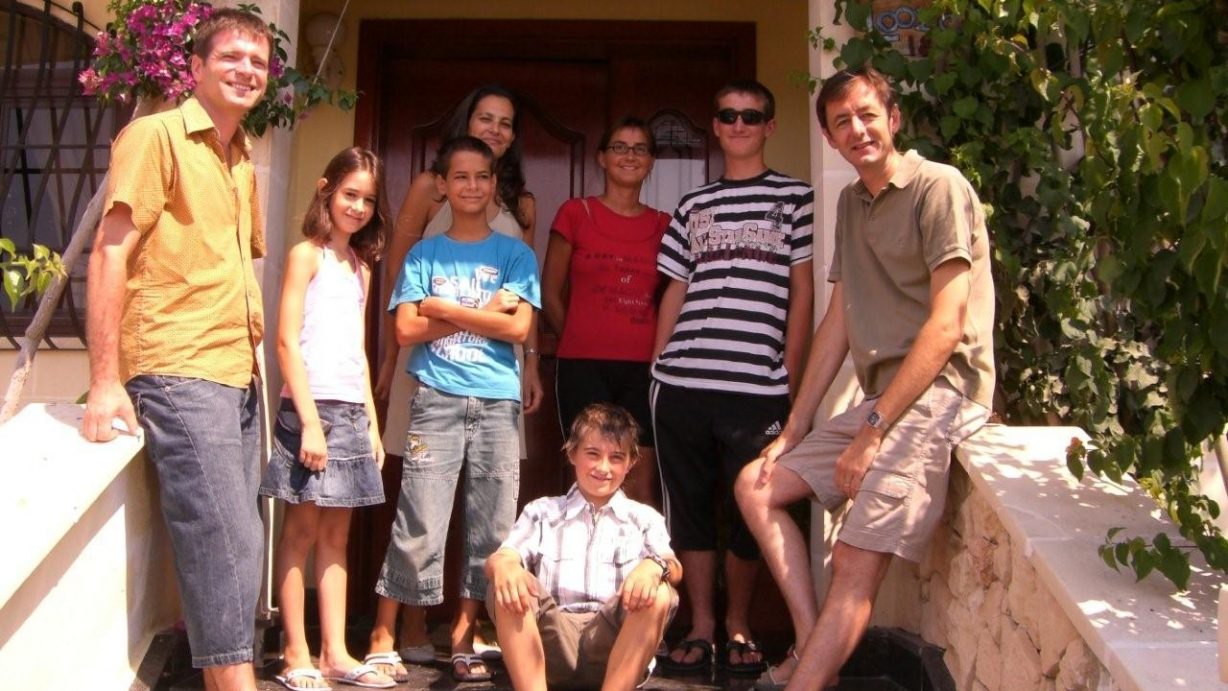Whether you’re assigned to a host family or choose to live with one during your time abroad, interacting with a host family can be the most culturally enriching and rewarding part of your time abroad. Especially if it is your first time in a new country, away from home in general, or first time speaking a new language, host families can provide a more structured, supportive, and welcoming environment than being completely on your own.
When I studied abroad in Annecy, France, for a summer, living with my host family was by far my favorite part of the experience and we’ve been able to keep in touch and visit each other several times since. Though every abroad experience requires a period of transition, I quickly felt very much like part of the family, and I was absolutely heartbroken to say goodbye to them at the end of the summer.
Choosing to live with a host family will most likely be prompted by your abroad goals. If you are looking to become fluent in a language or learn more about the deeper aspects of a culture, then perhaps a host family is a good option for you. It’s also a good option if you don’t have much prior travel experience or are afraid you may battle with particularly brutal homesickness during your time abroad.
Host families are not for everyone, however. If you feel a desire for more independence, or are more interested in exploring the city and meeting locals or other college students on your own, then maybe you’d prefer a dorm or apartment style living. Maybe you want to cook for yourself, travel frequently on the weekends, and be with your friends from your home university – that’s fine too, but just remember that you will always have those friends back at your home school. Your time abroad may be once in a lifetime, so set yourself up to get the most out of it that you possibly can, even if that means doing something different than what your friends choose to do and putting yourself even further outside your comfort zone.
If you choose to live with a family, or are assigned to one, here are a few things to keep in mind before you arrive that first day.
- First impressions matter.
The first week you spend with your host family will set the tone for the rest of your time living under their roof. While you’ll find that most host parents are fairly lenient and willi



- Be up front about needs and wants
If you have dietary restrictions, make sure they are aware of them. My first night with my host family, as my roommate and I were served meat stuffed peppers and eggplant, we discovered that our host mom wasn’t aware that we were vegetarians and had to have an awkward, overly apologetic conversation with her about how we didn’t eat meat. As an incredibly French women and chef, it took her quite some time to understand what exactly that meant. “Do you still eat ham?” The point is, make it known, even if it is slightly uncomfortable for a few minutes, because you may have a worse experience if you don’t.
- Be gracious
Upon arrival, it is often recommended to bring your host family a gift. Host families usually love learning 



- Dinner time is important
Especially if you are living with a European family, dinner is a highly valued social and cultural time. Some programs may mandate that you eat dinner with your family a certain number of times per week, others
may leave it up to you, but you will likely learn the most about your family and the culture over dinner. For example, the Spanish tend to eat dinner around 10pm, the French tend to always have wine at dinner, and the Danes tend to have dinners that can last for up to 3 or 4 hours. It all depends on the culture in which you have chosen to immerse yourself, but each family has a special tradition that they practice. Watch what your family does. How do they hold their utensils? What size portions do they eat? What combinations of food do they normally prepare for dinner? There is so much you can take in from just sharing a meal with someone, and dinners are often not only a great opportunity to observe, but to engage in cultural dialogues as well.
Dinnertime gives you a good opportunity to see the family in their everyday routine and to practice your language skills. Though you may feel nervous about holding a conversation for potentially several hours at a time, you will soon find yourself easing right into it.
- Pitch in around the house
Although you are a guest in the house, you can make yourself feel more like part of the family by pitching in to household chores. Some of my most distinct memories with my host family involved preparing dinner, doing dishes, and cleaning up the kitchen, all while dancing around the apartment and singing along to French radio. Not only will your host family really appreciate your effort, but yo



In some cultures, they will naturally expect you to make your bed, do your own laundry, or help during dinner, and you should do so, but don’t be afraid to ask if you can help too. A friend of mine living in a Danish homestay offered to babysit her host siblings a few times so her host parents could have a date night. I had other friends in Paris who offered to cook dinner one time, often a traditional American meal. I remember my roommate and I helped our host siblings with their English language homework, or sat with them while they practiced their musical instruments. By doing so, you make yourself part of the family, and when you miss home the most, you’ll be glad you did.
- A not-so rosy picture
This is not to say that all host family experiences are as wonderful as the one I was lucky enough to have had. Sometimes you might just not get along with one of your host parents or siblings, they may have different expectations for you than you imagined, or the language barrier proves to be too difficult. If that happens, consult the director of your abroad program to get advice or explore different placements, or talk to your friends also staying with host families to see what you can do to avoid conflict. After all, this is your home for however many months, and you want to feel comfort
able, safe and enjoy yourself.
_____________
So whether you’ve decided if you want to stay with a host family or not, think about what you hope to accomplish during your time abroad, and who you want to interact with. Host families are not for everyone, but they may become the reason you fall in love with a country and keep coming back for more. Some host families will start to feel like part of your family after just a few weeks, and I can tell you that that experience is irreplaceable.
************************
Have a host family experience to share? Questions for the author? Please leave a comment below!
[accordion_tab title=”Collegiate Correspondent: Sarah Brown” default]










